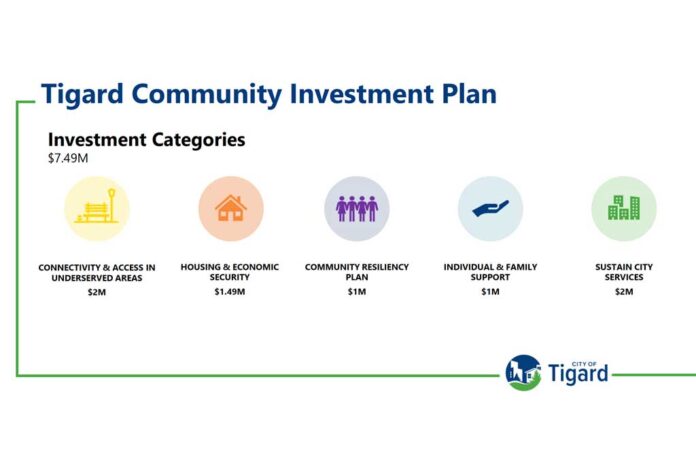
The City of Tigard is receiving well over $7 million in additional federal assistance over the next two fiscal years, and already questions are being raised over where that money should be spent.
City councilors are asking that a good chunk of that money go toward assistance for local residents and businesses, in much the same manner as was done with the Tigard AID and RAFT (Resident Aid Fund of Tigard) programs funded by last year’s Coronavirus Aid, Relief and Economic Security, or CARES Act. Those local programs and others used around $5.5 million in federal stimulus money to provide business grants as well as grants to local nonprofit groups serving low-income and homeless residents, as well as those economically impacted by the COVID-19 pandemic.
Now, city staff are proposing to use funds from the $1.85 trillion American Rescue Plan Act to boost connectivity to parks in underserved areas of Tigard ($2M); develop a community resiliency plan that will help protect against the effects of climate change, economic downturn, or earthquakes and other natural disasters ($1M); sustain city services ($2M); provide individual and family support for things like childcare or access to other services ($1M); and further economic and housing security aid for the community ($1.49M).
The first specific uses of these funds approved by the city council at its Aug. 10 meeting include a $25,000 mobile business incubator program aimed at food service.
“This is kind of modeled after that Opportunity Café in the library, so it’s for food-focused entrepreneurs impacted by COVID-19,” City Manager Steve Rymer said.
The other expenditure is $125,000 that will kick-start planning for the hoped-for resiliency plan.
At the same time, councilors asked why plans for further business and resident aid were not already in the works.
“Resilience is good,” said Councilor John Goodhouse. “But we have businesses that are still paying rents and catching up and it’s even hard to find staff after all of this. We need assistance for the businesses but also for nonprofits, they are still feeding people, housing them, helping them find jobs – all of these things are crucially needed.”
The council as a whole agreed but decided to wait to talk to nonprofits and other groups who received CARES Act aid before allocating further assistance at an upcoming meeting.



















